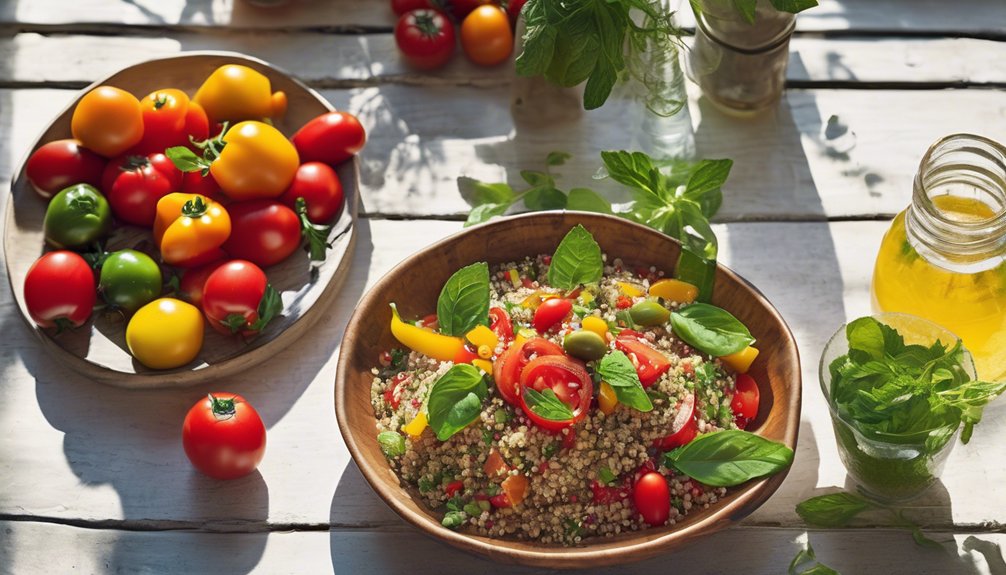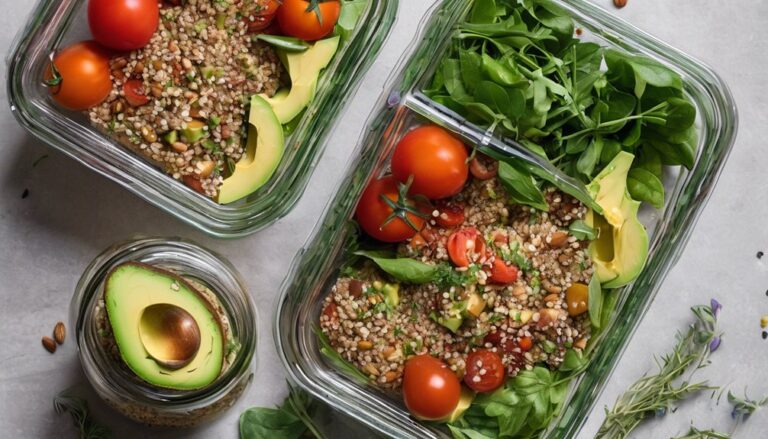Healthy Eating Habits That Last
Have you ever wondered why some people effortlessly maintain healthy eating habits while others struggle? Understanding your personal motivations is key to creating lasting change. By setting realistic goals and planning your meals, you can incorporate nourishing foods into your diet. But there's more to it than just what's on your plate. Exploring mindful eating and finding support can transform your relationship with food in ways you may not expect. Let's uncover these strategies together.
Key Takeaways
- Understand your personal motivations to create a strong commitment to healthy eating habits.
- Set realistic, attainable goals to build confidence and maintain engagement in your journey.
- Plan meals in advance to ensure balanced nutrition and reduce impulse eating.
- Incorporate a variety of whole foods to enhance nutrient intake and keep meals satisfying.
- Practice mindful eating by focusing on your food and recognizing hunger cues for better control.
Understand Your Why
Understanding your "why" is crucial when it comes to adopting healthy eating habits, as it drives your motivation and commitment. Reflect on your personal values—what truly matters to you? Maybe it's your health, well-being, or setting a positive example for loved ones.
Identifying these motivational triggers helps you stay focused on your goals. When you connect your choices to your deeper values, it becomes easier to resist temptations and make healthier decisions.
For instance, envision how nourishing your body with wholesome foods can lead to better energy and mood. This emotional connection not only sustains your drive but also transforms healthy eating from a chore into a fulfilling lifestyle choice.
Set Realistic Goals
Once you've identified your "why," the next step is to set realistic goals that align with your motivation.
Goal setting isn't just about aiming for the stars; it's about creating attainable milestones that keep you engaged and focused. Start small—maybe aim to incorporate one extra serving of vegetables each day or replace sugary snacks with fruits.
These realistic expectations help build momentum, making changes feel less overwhelming. Remember, it's a journey, not a race. Celebrate your progress along the way, no matter how minor it may seem.
This positive reinforcement will motivate you to keep going. By setting realistic goals, you create a sustainable path toward healthier eating habits that can truly last a lifetime.
Plan Your Meals
When you take the time to plan your meals, you set yourself up for success in adopting healthier eating habits.
Meal prep not only saves time but also helps you make mindful choices. Here are three steps to get you started:
- Create a Weekly Menu: Outline what you'll eat each day, focusing on balanced meals that include proteins, vegetables, and whole grains.
- Make a Grocery List: After planning your menu, list the ingredients you'll need. Stick to this list when you go grocery shopping to avoid impulse buys.
- Prep in Batches: Dedicate a few hours each week to prep your meals. Chop veggies, cook grains, or even portion out snacks.
With a little planning, you can nourish your body and simplify your week!
Incorporate Whole Foods
Incorporating whole foods into your diet can significantly enhance your health and well-being, as these nutrient-dense options provide essential vitamins, minerals, and fiber.
By choosing whole grains, fresh fruits, and vegetables, you'll nourish your body and support overall vitality. Focus on seasonal produce, which not only tastes better but also offers peak nutrient density.
When you eat in sync with the seasons, you'll enjoy a variety of flavors while benefiting from the maximum nutritional value. Try to fill your plate with colorful, whole ingredients, as they can help you feel more satisfied and energized.
Practice Mindful Eating
Practicing mindful eating can transform your relationship with food, allowing you to savor each bite and truly listen to your body's hunger cues.
By focusing on mindful moments, you can enhance your mealtime experience and strengthen your connection with your body. Here are three simple ways to get started:
- Eliminate distractions: Turn off the TV and put down your phone. This helps you concentrate on your meal and enjoy it fully.
- Chew slowly: Take your time with each bite, which aids digestion and promotes portion control.
- Tune into your body: Pause during meals to assess your hunger and fullness levels, ensuring you eat only what you need.
Stay Hydrated
Mindful eating not only enhances your appreciation for food but also sets the stage for another vital aspect of healthy living: staying hydrated. Proper hydration is essential for your overall health, boosting energy levels and aiding digestion. To help you, here are some effective hydration strategies and sources:
| Hydration Sources | Hydration Strategies |
|---|---|
| Water | Set reminders to drink |
| Fruits (e.g., watermelon) | Carry a reusable water bottle |
| Vegetables (e.g., cucumber) | Infuse your water with fruits |
| Herbal teas | Drink a glass before meals |
| Coconut water | Track your daily intake |
Incorporating these strategies into your daily routine can make a significant difference in how you feel. So, keep that water flowing!
Keep Healthy Snacks on Hand
Keeping healthy snacks on hand can significantly improve your dietary choices and prevent unhealthy cravings.
By focusing on nutrient density and portion control, you can create a satisfying snacking experience. Here are three easy snacks to consider:
- Nut Butter and Apple Slices: This combo offers great flavor combinations and healthy fats.
- Greek Yogurt with Berries: Packed with protein and antioxidants, it provides both taste and nutrition.
- Veggies and Hummus: A crunchy, satisfying option that boasts shelf stability and versatility.
Cook at Home More Often
Cooking at home more often not only allows you to control the ingredients in your meals but also fosters healthier eating habits overall. By honing your cooking techniques and engaging in meal prep, you can create nutritious dishes tailored to your taste. Plus, it's a great way to bond with family or friends.
| Cooking Techniques | Benefits |
|---|---|
| Sautéing | Retains nutrients |
| Baking | Low-fat cooking method |
| Steaming | Preserves flavors |
With every homemade meal, you're not just feeding your body; you're nurturing your well-being. Embrace the joy of cooking, experiment with new recipes, and you'll find that healthy eating becomes a delightful part of your daily routine.
Find Support and Accountability
Finding support and accountability can significantly enhance your journey toward healthier eating habits.
When you connect with others, you create a network that fosters motivation and encouragement.
Here are three ways to find that support:
- Join a Support Group: Engaging with a community that shares similar goals can provide you with valuable insights and emotional backing.
- Find an Accountability Partner: Team up with someone who shares your commitment to healthy eating. Regular check-ins can keep you on track and motivated.
- Utilize Online Platforms: Many apps and forums are dedicated to healthy eating, allowing you to share experiences and gain support from a wider audience.
Allow for Flexibility and Enjoyment
While striving for healthier eating habits is important, allowing for flexibility and enjoyment in your diet can make the journey more sustainable and rewarding. Embracing cheat meals and indulging in treats occasionally fosters a balanced approach, promoting guilt-free eating. Here's a simple table to consider:
| Day | Meal Type | Example |
|---|---|---|
| Monday | Healthy Meal | Grilled chicken salad |
| Tuesday | Cheat Meal | Pizza night |
| Wednesday | Healthy Meal | Quinoa bowl |
| Thursday | Indulgent Treat | Dark chocolate |
| Friday | Healthy Meal | Baked salmon |
Frequently Asked Questions
How Do I Deal With Cravings for Unhealthy Foods?
When cravings hit, identify your craving triggers. Instead of giving in, try healthy substitutes like fruits or nuts. This way, you satisfy your urge while still nourishing your body, making healthier choices feel rewarding.
What if I Have Dietary Restrictions or Allergies?
Oh, the drama of dietary restrictions! You can't just snack on anything. Embrace substitute ingredients and try allergy-safe snacks. Your taste buds won't know the difference, and your body will thank you for it!
Can I Still Enjoy Dining Out While Eating Healthy?
Absolutely, you can enjoy dining out! Focus on restaurant choices that offer healthy substitutions, like swapping fries for a salad. Don't hesitate to ask your server for options that align with your health goals.
How Can I Stay Motivated During Setbacks?
Think of setbacks as bumps on a winding road. When they occur, focus on goal setting and celebrate small victories through positive reinforcement. Each step forward strengthens your resolve and keeps your journey vibrant and fulfilling.
What Are Some Quick Healthy Meal Options?
For quick breakfast ideas, try overnight oats or yogurt with fruit. For easy snack options, grab raw veggies with hummus or a handful of nuts. These choices fuel your body without taking much time. Enjoy!
Conclusion
Incorporating healthy eating habits into your life is a journey, not a sprint. By understanding your motivations and setting realistic goals, you can make sustainable choices that nourish your body and mind. Remember, it's not just about the destination; it's about enjoying the ride. Celebrate your progress, stay flexible, and surround yourself with supportive people. As you embrace these practices, you'll find that lasting change is within reach, helping you create a fulfilling and balanced lifestyle.











